现在完成时&现在完成进行时的用法
现在完成时常用句型

现在完成时常用句型1. “I have already eaten breakfast.” 早上我起来后,妈妈问我:“宝贝,吃早餐了吗?”我拍拍肚子说:“I have already eaten breakfast.”2. “You have juste back from school.” 我一进家门,爸爸就说:“You have juste back from school.”3. “We have played this game before.” 小伙伴们来找我玩游戏,其中一个说:“我们玩这个游戏吧。
”我回答:“We have played this game before.”4. “He has already done his homework.” 我去找小明玩,他妈妈说:“他在房间呢,He has already done his homework.”5. “She has watched this movie many times.” 我们讨论电影的时候,小红说:“这部电影超好看。
”我回应:“She has watched this movie many times.”6. “They have gone to the park.” 我问弟弟妹妹们去哪了,妈妈说:“They have gone to the park.”7. “I have known him for a long time.” 朋友好奇地问我和那个人认识多久了,我笑着说:“I have known him for a long time.”8. “You have read this book, haven't you?” 我拿着书问同桌:“You have read this book, haven't you?”9. “We have visited that place before.” 一家人商量去哪里玩,我突然想起说:“We have visited that place before.”10. “He has made a lot of mistakes.” 老师看着小明的作业说:“He has made a lot of mistakes.”。
现在完成时
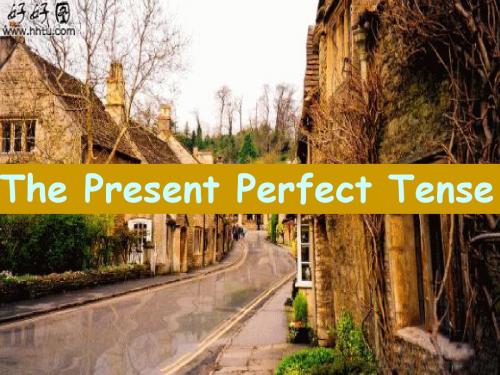
请大家认真分析比较下列各例句:
•
• • • • • • • • • • • • • •
I saw this film yesterday. (只说明动作发生在过去。) I have seen this film. (强调对现在的影响,电影的内容已经知道了。) She has returned from Paris. (她已从巴黎回来了。) She returned yesterday. (她是昨天回来的。) He has been in the League for three years. (在团内的状态可延续) He joined the League three years ago. ( 三年前入团,joined为短暂行为。) 注意:句子中如有一般过去时的时间副词(如 yesterday, last week, in 1960)时,不能使用现在完成时,要用过去时。例如: (错)Tom has written a letter to his parents last night. (对)Tom wrote a letter to his parents last night.
We have had the book for three years. We bought the book three years ago.
②他感冒三天了. He has had a cold for three days.
He caught a cold three days ago.
③自从上星期以来,我就借了这本书.
⑤ Mr Black死了三年了。
Mr Black has been dead for three years. Mr Black died three years ago.
现在完成时态
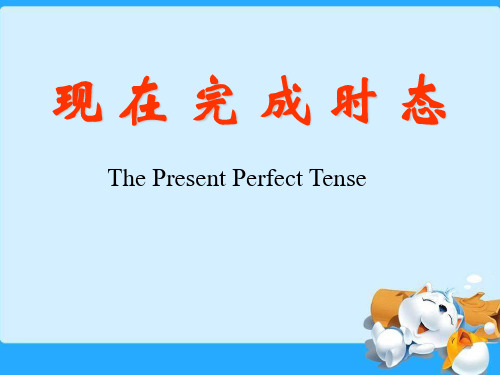
• ⑤ get up → be up; die → be dead; leave sp. → be away from sp. fall asleep / get tot sleep → be asleep; finish / end → be over;marry → be married; 1) I got up two hours ago.I ________ ______ _______since _______________. 2) He left Shanghai just now.He _______ _____________ ______ Shanghai for five minutes. 3) My grandpa died in 2002.My grandpa _______ _____ ______for _______ ________. 4) The meeting finished at six.The meeting ________ ______ ______ for six hours. 5) I got to sleep two hours ago .I ________ _____ ___ since _________ _________. 6) They married in 1990. They ________ _________ __________since _________. ⑥ start / begin to do sth. → do sth. ;begin → be on 1) I began to teach at this school in 1995. I ____ ____ at this school since ____. 2) The film began two minutes ago. The film ____ ____ ____ for ____ ____.
现在完成时
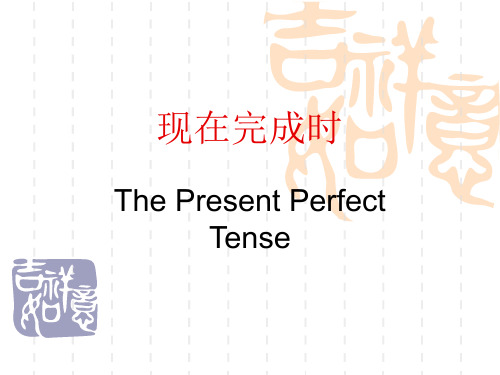
5. just在现在完成时中的用法 用于句中, 表示“刚刚” Eg. I’ve just had breakfast. What have they just done?
现在完成时
The Present Perfect Tense
定义
现在完成时(Present perfect tense)过去 发生并且已经完成的动作对现在造成影响 或后果,过去某一时间开始并一直持续到 现在并且有可能还会持续的动作或状态。
基本结构
肯定句:主语+have/has+过去分词+其他
4. never在现在完成时中的用法
否定句: 句中 “从来没有 ” Eg. I’ve never been to Beijing.
注: 带ever的肯定句变否定句时, 要将 ever变成never; 带ever的一般疑问句作 否定回答时可用“No, never.”
Eg. He has ever made dumplings.
否定句:主语+have/has+not+过去分词+其 他 Have/Has+主语+过去分词+ 一般疑问句: 其他 特殊疑问词+一般疑问句 特殊疑问句: (have/has+主语+过去 分词+其他)
She has learnt English for 3 years 否定句: She hasn't leant English for 3 years. 一般疑问句: Has she leant English for 3 years?
现在完成时的用法详解英语

• Is your father in ?
•
No, heha__s_g__o_n__e__t_o___ to Shenzhen.
•
H__a__s___he everb_e_e__n__ there before ?
•
Yes, heh_a_s__b_e__e_n_____ there several times
ago.
A. Did…copy…did
B. Have…copied…have
C. Have…copied…did D. Did …copy…had
5. “Why _A_____ she _______ angry ?”
“Because he _____ at her just now .”
A. did…get…shouted B. has…got…shouted
A. Have…gone to B. Have…gone in
C. Have…been to D. Have …been in
3. My brother _C___college for over three years.
A. has gone to B. has been to C. has been at
但是不能和表示一段时间的状语连用。
短暂性动词变延续性动词:
• join --- be in / a
2) comeb-e-- in / at
• 3) borrow ---keep 4) buy -h-a-ve
5) arrive ---be
6) leave b--e- away (from)
7) begin --b- e on
• It has been colds_in__c_e__ two weeks ago.
现在完成时的标志词有哪些怎么使用

现在完成时的标志词有哪些怎么使⽤现在完成时的标志词有already、yet、just、never、ever、before、since等,下⾯是具体⽤法整理,⼀起来看!现在完成时的标志词及⽤法⼀、already adv.早已,已经;先前;⽤在肯定句中(be动词、助动词、情态动词之后,实意动词之前)常与yet进⾏转换。
例如:I have already finished the work.翻译:我已经完成这项⼯作了。
改为否定句:I haven't finished the work yet.翻译:我还没有完成这项⼯作。
改为⼀般疑问句:Have you finished the work yet.⼆、yet adv. 还;但是;已经;⼜,再放在否定句和⼀般疑问句句末。
例句:1、I didn't receive a letter from him yet.翻译:我还没有收到过他的信。
2、Have you eaten yet?翻译:你吃饭了吗?三、just只⽤于陈述句,意思是:刚才,放在have和has的后⾯。
例句:I have just receivde a letter .翻译:我刚收到⼀份信。
四、never⽤于否定句译为:从不,放在have和has的后⾯。
例句:I've never been to Beijing.翻译:我从未去过北京。
五、ever⽤于疑问句译为“曾经,放在have和has的后⾯。
例句:Have you ever been to Beijing?翻译:你曾经去过北京吗?六、before⽤于肯定句译为:以前,放在have和has的后⾯,⼀般放在句末。
例句:He has never been to Beijing before.翻译:他以前从未去过北京。
七、since+延续动词⽤⼀般过去时态或现在完成时态均可,意但思不⼀样:⽤⼀般过去时态,表⽰从句动作”结束“以来,主句活动在持续;⽤现在完成时态,表⽰从句动作”开始“以来,主句活动在持续。
各种完成时

already; yet; by this time; just; ever; never;
now; before; lately 等。
现在完成时考点
现在完成时与时间状语up to now, so far, up till now等连用。 例如: So far we have finished 9 passages.
将来完成时:will have +动词过去分词 将来完成时表示将来某一时刻之前已经完成的动作。 例如:I’ll have finished my work by this time tomorrow. Before long he will have forgotten all about it. 考点:
完成时:
1、现在完成时:have/has+动词的过去 分词 2、过去完成时:had+动词的过去分词 3、将来完成时:will have+动词的过去 完成时 4.现在完成进行时:will have been doing.
1. 表示动作已经完成,强调过去 发生的某一 动作对现在造成的影响和结果。一般过去 时仅仅说明动作在过去,不强调对现在的 影响。 常与一些时间状语连用:如:
将来完成时与by+将来的时间连用。
Mary will have taken 58 credits by the time she graduates.
练习: 1. I hope they D this road by the time we come back next year. A. have repaired C. are to repair B. will repair D. will have repaired
现在完成时用法大全
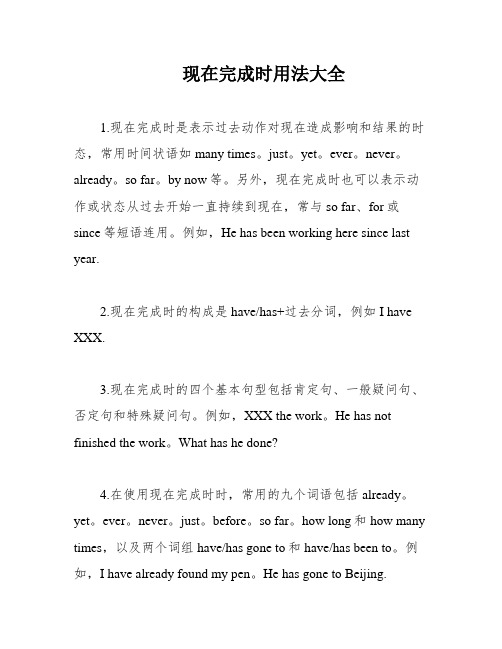
现在完成时用法大全1.现在完成时是表示过去动作对现在造成影响和结果的时态,常用时间状语如many times。
just。
yet。
ever。
never。
already。
so far。
by now等。
另外,现在完成时也可以表示动作或状态从过去开始一直持续到现在,常与so far、for或since等短语连用。
例如,He has been working here since last year.2.现在完成时的构成是have/has+过去分词,例如I have XXX.3.现在完成时的四个基本句型包括肯定句、一般疑问句、否定句和特殊疑问句。
例如,XXX the work。
He has not finished the work。
What has he done?4.在使用现在完成时时,常用的九个词语包括already。
yet。
ever。
never。
just。
before。
so far。
how long和how many times,以及两个词组have/has gone to和have/has been to。
例如,I have already found my pen。
He has gone to Beijing.Jim has been living in this city for two months。
Lucy has been living in Beijing since three years ago。
He has been in China since he arrived here。
If there is no time adverb in the sentence。
the present perfect tense is often used to convey the meaning of "already" in Chinese。
For example。
"Have you lost your library book?" can be translated as "你已经弄丢了从图书馆借的那本书吗?"The present perfect tense is also commonly used in the following sentence patterns: "They have planted many trees in the last few years," "This is the best book I have ever read," and "It is the first time I have played computer games."In the present perfect tense。
现在完成时16个标志词

现在完成时16个标志词标志词:just,ever,never,yet,already,for,before,since,so far,recently,twice,still,till now,up to now,three times等。
现在完成时标志词already⽤在肯定句中(be动词、助动词、情态动词之后,实意动词之前)常与yet进⾏转换。
例如:I have already finished the work.我已经完成这项⼯作了。
改为否定句:I haven't finished the work yet.我还没有完成这项⼯作。
改为⼀般疑问句:Have you finished the work yet?yet放在否定句和⼀般疑问句句末。
其他的标志词:just,before,recently,still,lately,never,ever,twice,on several occasions,in the past/last fewdays/weeks/months/years,(up to)these few days/weeks/months/years,this morning/week/month/year(多⽤于⼀般过去时),up to present,so far,up to now,up till now,till now。
since+时间点=for+时间段=since+时间段+agosince+⼀般过去时态的时间状语从句。
例如:He has been here since he joined the army。
⾃从他参军以来,他⼀直在这⼉。
before表⽰之前发⽣的事情,放在句末例如:I have been to this place before.我之前去过了这个地⽅just表⽰刚刚做过的事情,放在have/has后⾯例句:I have just cleaned my room.我刚刚清理了我的房间ever表⽰经常的或习惯性的动作,常与表⽰频率的时间状语连⽤。
英语现在完成时(完整)
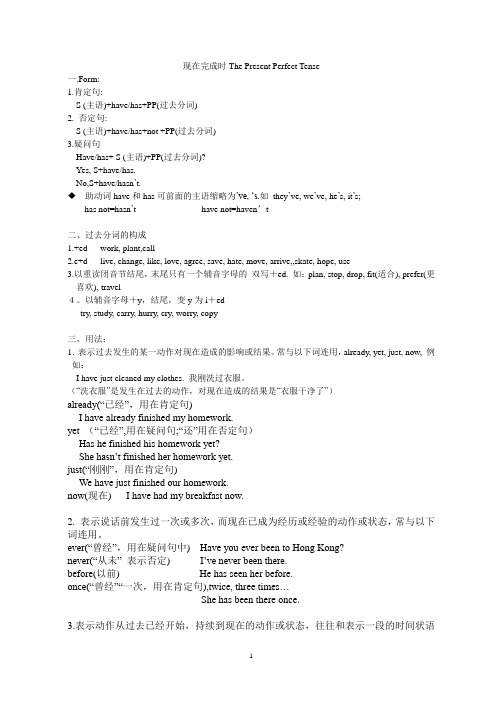
现在完成时The Present Perfect Tense一.Form:1.肯定句:S (主语)+have/has+PP(过去分词)2. 否定句:S (主语)+have/has+not +PP(过去分词)3.疑问句Have/has+ S (主语)+PP(过去分词)?Yes, S+have/has.No,S+have/hasn’t.助动词have和has可前面的主语缩略为’ve, ‘s.如they’ve, we’ve, he’s, it’s;has not=hasn’t have not=haven’t二、过去分词的构成1.+ed work, plant,call2.e+d live, change, like, love, agree, save, hate, move, arrive,,skate, hope, use3.以重读闭音节结尾,末尾只有一个辅音字母的双写+ed. 如:plan, stop, drop, fit(适合), prefer(更喜欢), travel4。
以辅音字母+y,结尾,变y为i+edtry, study, carry, hurry, cry, worry, copy三,用法:1.表示过去发生的某一动作对现在造成的影响或结果。
常与以下词连用,already, yet, just, now, 例如:I have just cleaned my clothes. 我刚洗过衣服。
(“洗衣服”是发生在过去的动作,对现在造成的结果是“衣服干净了”)already(“已经”,用在肯定句)I have already finished my homework.yet (“已经”,用在疑问句;“还”用在否定句)Has he finished his homework yet?She hasn’t finished her homework yet.just(“刚刚”,用在肯定句)We have just finished our homework.now(现在) I have had my breakfast now.2. 表示说话前发生过一次或多次,而现在已成为经历或经验的动作或状态,常与以下词连用。
现在完成时与过去完成时的区别
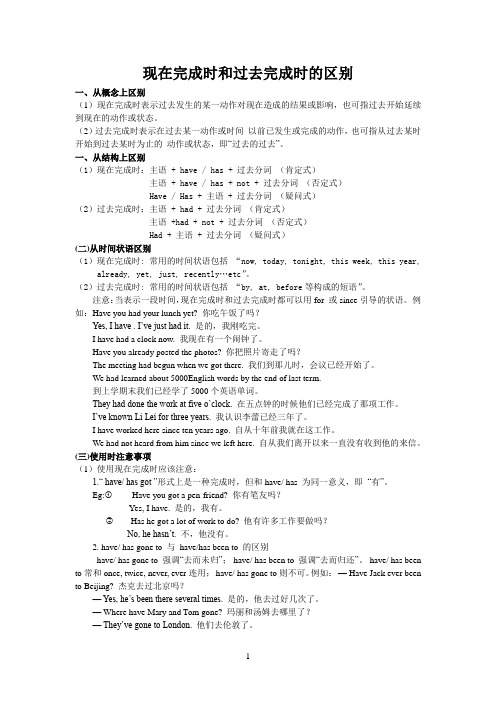
现在完成时和过去完成时的区别一、从概念上区别(1)现在完成时表示过去发生的某一动作对现在造成的结果或影响,也可指过去开始延续到现在的动作或状态。
(2)过去完成时表示在过去某一动作或时间以前已发生或完成的动作,也可指从过去某时开始到过去某时为止的动作或状态,即“过去的过去”。
一、从结构上区别(1)现在完成时:主语 + have / has + 过去分词(肯定式)主语 + have / has + not + 过去分词(否定式)Have / Has + 主语 + 过去分词(疑问式)(2)过去完成时:主语 + had + 过去分词(肯定式)主语 +had + not + 过去分词(否定式)Had + 主语 + 过去分词(疑问式)(二)从时间状语区别(1)现在完成时: 常用的时间状语包括“now, today, tonight, this week, this year, already, yet, just, recently…etc”。
(2)过去完成时: 常用的时间状语包括“by, at, before等构成的短语”。
注意:当表示一段时间,现在完成时和过去完成时都可以用for 或since引导的状语。
例如:Have you had your lunch yet? 你吃午饭了吗?Y es, I have . I’ve just had it. 是的,我刚吃完。
I have had a clock now. 我现在有一个闹钟了。
Have you already posted the photos? 你把照片寄走了吗?The meeting had begun when we got there. 我们到那儿时,会议已经开始了。
We had learned about 5000English words by the end of last term.到上学期末我们已经学了5000个英语单词。
They had done the work at five o’clock. 在五点钟的时候他们已经完成了那项工作。
现在完成时态(详细)

He ______ saw it last week.
have been 3. How many times _____you______(be) there?
上一页 主菜单 下一页
have read (read) the novel twice. It’s interesting. 4. I __________
get (to)-- be (in/at) close-be closed
reach--be (in/at) buy-- have
borrow-- keep
open--be open
return-- be back marry--be married
finish-- be over
become-be
上一页 主菜单
下一页
用have been to, have gone to, have been in 填空
have been in Beijing for 1. Mike and his parents __________ half a year. has gone to 2. Mum is not at home now. she _________ the shop. Have you ever _____ been to kunming ? Never. 3. ______ have you ______ been these days? 4. Where _____ 5. Has Jim arrived yet? has been Yes, he _______ here for several days. 6. Where is Peter? I don’t know where he has gone ________. have you _____ been ? 7. Hi Jim! Where _____
现在完成时的用法
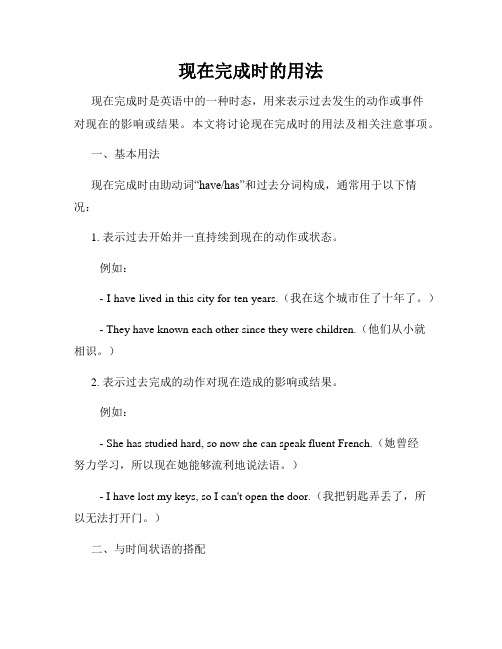
现在完成时的用法现在完成时是英语中的一种时态,用来表示过去发生的动作或事件对现在的影响或结果。
本文将讨论现在完成时的用法及相关注意事项。
一、基本用法现在完成时由助动词“have/has”和过去分词构成,通常用于以下情况:1. 表示过去开始并一直持续到现在的动作或状态。
例如:- I have lived in this city for ten years.(我在这个城市住了十年了。
) - They have known each other since they were children.(他们从小就相识。
)2. 表示过去完成的动作对现在造成的影响或结果。
例如:- She has studied hard, so now she can speak fluent French.(她曾经努力学习,所以现在她能够流利地说法语。
)- I have lost my keys, so I can't open the door.(我把钥匙弄丢了,所以无法打开门。
)二、与时间状语的搭配现在完成时经常与表示过去发生的时间状语连用,具体可以分为以下几种情况:1. 点时间状语:表示具体的某个时间点。
例如:- I have visited Beijing three times.(我已经去过北京三次了。
) - She has finished her homework just now.(她刚刚完成了作业。
)2. 时间段状语:表示某一段时间的延续。
例如:- They have been friends for many years.(他们已经是多年的朋友了。
)- We haven't seen each other since last summer.(我们自去年夏天以来就没见面了。
)3. 到目前为止的状语:表示从过去某一时间到现在为止。
例如:- He has already eaten lunch.(他已经吃过午饭了。
现在完成时
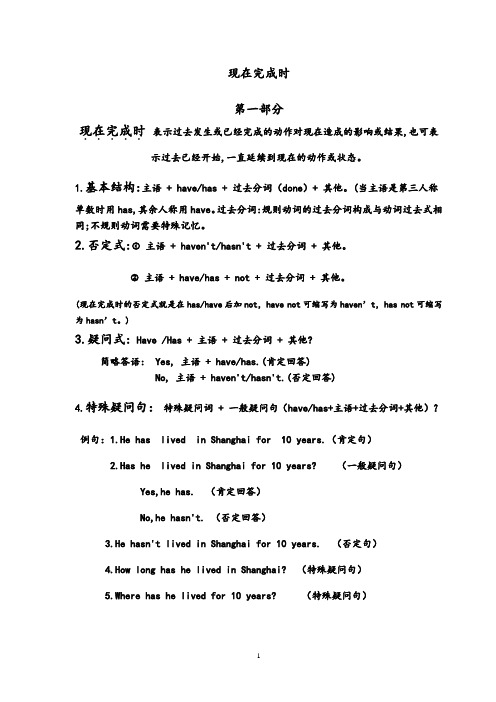
现在完成时第一部分现在完成时.....表示过去发生或已经完成的动作对现在造成的影响或结果,也可表示过去已经开始,一直延续到现在的动作或状态。
1.基本结构:主语+ have/has + 过去分词(done)+ 其他。
(当主语是第三人称单数时用has,其余人称用have。
过去分词:规则动词的过去分词构成与动词过去式相同;不规则动词需要特殊记忆。
2.否定式:①主语+ haven't/hasn't + 过去分词+ 其他。
②主语+ have/has + not + 过去分词+ 其他。
(现在完成时的否定式就是在has/have后加not,have not可缩写为haven’t,has not可缩写为hasn’t。
)3.疑问式: Have /Has + 主语+ 过去分词+ 其他?简略答语: Yes, 主语+ have/has.(肯定回答)No, 主语+ haven't/hasn't.(否定回答)4.特殊疑问句:特殊疑问词+ 一般疑问句(have/has+主语+过去分词+其他)?例句:1.He has lived in Shanghai for 10 years.(肯定句)2.Has he lived in Shanghai for 10 years? (一般疑问句)Yes,he has. (肯定回答)No,he hasn't. (否定回答)3.He hasn't lived in Shanghai for 10 years. (否定句)4.How long has he lived in Shanghai? (特殊疑问句)5.Where has he lived for 10 years? (特殊疑问句)①当have/has被用在现在完成时态中时,它可以和前面的代名词一起组成缩写形式。
have可缩写为’ve,has可缩写为’s。
如:I've ,He's②现在完成时用not来表达否定形式。
现在完成时

时间关系:现在完成时的时间点在 过去,一般将来时的时间点在将来
添加标题
添加标题
添加标题
添加标题
时态构成:现在完成时由have+动 词的过去分词构成,一般将来时由 will+动词原形构成
强调重点:现在完成时强调对现在 的影响或结果,一般将来时强调对 未来的预测和计划
现在完成时的常见句型
It is the first time that+现在完成时
感谢您的耐心观看
汇报人:
添加副标题
现在完成时
汇报人:
目录
CONTENTS
01 现在完成时的定义
02 现在完成时的构成
03 现在完成时的用法
04 现在完成时的注意 事项
05 现在完成时的常见 句型
06 现在完成时的练习 与巩固
现在完成时的定义
定义:现在完成时表示动作已经发 生并完成,对现在产生影响
动作已经发生并完成
时间状语:already, yet, just, ever, never, before 等
现在完成时的注意事项
短暂性动词不能与表示一段时间的状语连用
定义:短暂性动词也称瞬间动词或非延续性动词,表示动作瞬间完成,不能与表示一段时间的状语 连用。
常见短暂性动词举例:leave、go、come、arrive、die等。
注意事项:短暂性动词不能与表示一段时间的状语连用,如for+一段时间或since+时间点。
添加标题
添加标题
结构:have/has+过去分词
添加标题
添加标题
语态:主动语态和被动语态
对现在有影响或结果
现在完成时是一种 时态,表示动作发 生在过去,但对现 在有影响或结果
英语时态:现在完成时
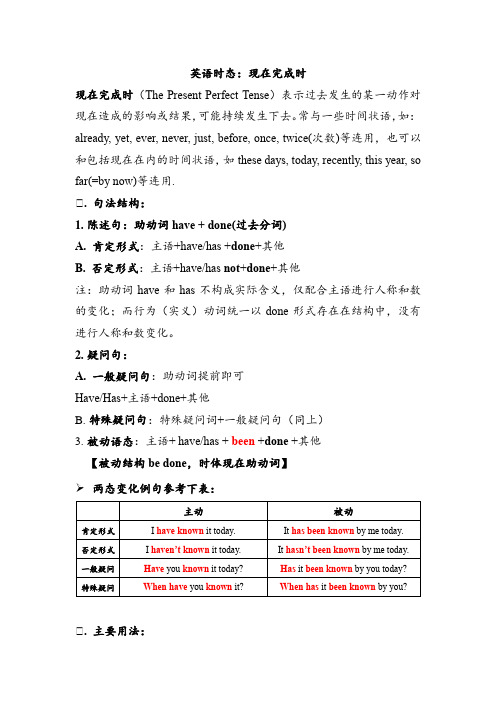
英语时态:现在完成时现在完成时(The Present Perfect Tense)表示过去发生的某一动作对现在造成的影响或结果,可能持续发生下去。
常与一些时间状语,如:already, yet, ever, never, just, before, once, twice(次数)等连用,也可以和包括现在在内的时间状语,如these days, today, recently, this year, so far(=by now)等连用.Ⅰ. 句法结构:1.陈述句:助动词have + done(过去分词)A. 肯定形式:主语+have/has +done+其他B. 否定形式:主语+have/has not+done+其他注:助动词have和has不构成实际含义,仅配合主语进行人称和数的变化;而行为(实义)动词统一以done形式存在在结构中,没有进行人称和数变化。
2.疑问句:A. 一般疑问句:助动词提前即可Have/Has+主语+done+其他B.特殊疑问句:特殊疑问词+一般疑问句(同上)3.被动语态:主语+ have/has + been +done +其他【被动结构be done,时体现在助动词】➢两态变化例句参考下表:Ⅰ. 主要用法:1.表示到说话人说话时已经完成的动作,却对现在仍有影响或结果。
He has lost his book.2.表示事情开始与过去,却一直持续到现在还在进行的事情。
He has taught in our school for 30 years.3.表示从过去某个时间直到现在的这个时间范围内不断重复发生的动作或情况,并且这个不断重复的动作有可能继续下去,也有可能到现在就结束。
My father has always gone to work by bike.4.同一般现在时可以表示将来一样,现在完成时也可以在时间状语从句里表示将来。
I’ll wait until he has written his letter.Ⅰ. 常用于现在完成时的时间状语:for, since, already, yet, ever, never, recently, just, before, so far, by now等1.for+段时间;since+(过去的某一个)点时间I have lived in Nanning for ten years.I have lived in Nanning since ten years ago.2.already用于肯定句, 可放在助动词之后、过去分词之前,也可放在句末。
现在完成时
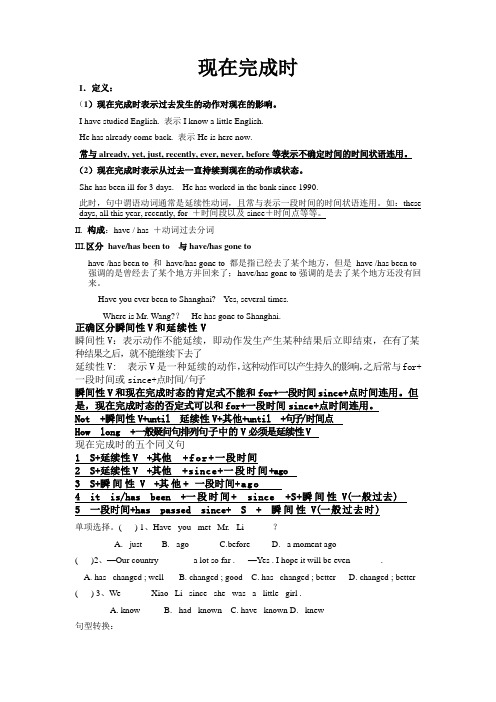
现在完成时I.定义:(1)现在完成时表示过去发生的动作对现在的影响。
I have studied English. 表示I know a little English.He has already come back. 表示He is here now.常与already, yet, just, recently, ever, never, before等表示不确定时间的时间状语连用。
(2)现在完成时表示从过去一直持续到现在的动作或状态。
She has been ill for 3 days. He has worked in the bank since 1990.此时,句中谓语动词通常是延续性动词,且常与表示一段时间的时间状语连用。
如:these days, all this year, recently, for +时间段以及since+时间点等等。
II. 构成:have / has +动词过去分词III.区分have/has been to 与have/has gone tohave /has been to 和have/has gone to 都是指已经去了某个地方,但是have /has been to 强调的是曾经去了某个地方并回来了;have/has gone to强调的是去了某个地方还没有回来。
--Have you ever been to Shanghai? --Yes, several times.单项选择。
( ) 1、Have you met Mr. Li ______?A. justB. agoC.beforeD. a moment ago( )2、—Our country ______ a lot so far . —Yes . I hope it will be even ______ .A. has changed ; wellB. changed ; goodC. has changed ; betterD. changed ; better ( ) 3、We ______ Xiao Li since she was a little girl .A. knowB. had knownC. have knownD. knew句型转换:1、They have been here since 2000. (对划线部分提问) have they been here?2、The old man _________ last year. He for a year. (die)(动词填空)3、Miss Gao left an hour ago. (同义句)Miss Gao________ ______ ______ ______ an hour ago.4、Her mother has been a Party member for three years .(同义句)Her mother _______ the Party three years ________ .()1.—Have you ever _________to a water park? —No,I haven’t. A. gone B. been C. visited ()2. —I enjoy ice skating.—_______________.A. I do so. B. So I do. C. So do I. ()3. —I have__________been to U.S.A.—Neither has Jim.A. never B. ever C. already ()4.My teacher is_______years old.A. 30 more than B. more than 30 C. more 30 than ()5. You can rent a bike if you want to get some _____.A.exercise B. exercises C. exrecise ()6.I’ve never ____________other countries.A. traveled B. traveled to C. travelled()7.All I ever wanted to do ____________become a teacher. A. is B. is to C.is want1. I __________(finish)today’s homework already. What about you?2. He ____________ just ____________(decide) to join the swimming club.3. _______you ____________(see) Jack recently? ——No , I haven’ t.4. How long ____________ you ____________(be) in class today?5. How many English words ____________ they ____________(learn)?6. He ___________ ever ___________ (be) to the History Museum several times.7. — _____________ you ever ___________ (be) to the zoo?—Yes. I ____ (go) there last summer. I __ (see) many kinds of animals there.8. —Where is Mr. Wang?—He _________ (go) to the library. He wants to borrow some library books.( ) 1. ----_____ you ever _____ to an aquarium? ----Yes, we had a good time there.A. Have, goneB. Had, beenC. Have, been( ) 2. I _____ my grandpa last Sunday.A. have visited B. visited C. was visiting ( ) 3. She _____ Shanghai for a month.A. has come to B. came to C. has been in ( ) 4. Lu Xun _____ more than fifty years ago.A. died B. has died C. has been dead ( ) 5. Fanny _____ TV at this time last Saturday.A. has watched B. was watching C. watched ( ) 6. ---- Have you ____ been to our town before?---- No, it's the first time I ___ here.A. even, have comeB. ever, comeC. ever, have come所给词的适当形式填空1. Have you ever _______________(study) with more than three friends?2. Has Tom ever ______________(travel) to China?3. Have you ever_________(say) something you didn’t want to say?4. I have never _____________(argue) with my parents.5. I ____________(go) to the space museum last year.6. Harvey____________(have) a great time at the Water World.选择填空(have / has been 或have/has gone)1. A:I saw you in Harry ’s Restaurant last night.B:No, it wasn’t me. I _______ never __________ there.2. A:Sal ly and Tim are on holiday, aren’t they? Where ____they _______?B:To Florida, again.A:How many times _______they ______ there? B:This is their third visit.3. A:Can I have an apple, please?B:We haven’t got any. I_____ not ____ to the shops today.4. A:W here’s Tony? B:He’s got a headache so he _________to bed.5. A:(on the phone)Can I speak to Mary, please?B:She’s out, I’m afraid. She ________ to the cinema this evening.( )1. His father the Party since 1978 A.joined B.has joined C.was in D.has been in ( )2.- How long have you here ?-About two months. A.been eD.arrived ( )3.Hurry up ! The play for ten minutesA.has begunB.had begunC.has been onD.began( )4.It ten years since he left the army.A.is B.has C.will D.was( )5. My parents Shandong for ten years.A.have been inB.have been toC.have gone toD.have been ( )6.His uncle for more than 9 years.A.has come hereB.has started to workC.hav lived thereD.has left the university ( )1. _____ you ever _____ to an aquarium? Yes, we had a good time there.A. Have, goneB. Had, beenC. Have, been( ) 2. I _____ my grandpa last Sunday.A. have visitedB. visitedC. was visiting( ) 3. She _____ Shanghai for a month.A. has come toB. came toC. has been in( ) 4. Mr. Hu died last year. He ____for several months alredy.A. has been dyingB. has diedC. has been deadD. died( ) 5. Fanny _____ TV at this time last Saturday.A. has watchedB. was watchingC. watched( ) 6 Have you ____ been to our town before? No, it's the first time I ___ here.A. even, have comeB. ever, comeC. ever, have come( )7. May ______ the book for two weeks.A. borrowedB. lentC. keptD. bought。
现在完成时的概念

现在完成时(Present Perfect Tense)概述现在完成时是英语中的一种时态,用来表示过去发生的动作或事件与现在的关系。
它使用助动词“have” 或“has” 和动词的过去分词形式构成,具体形式为“have/has + 过去分词”。
1. 定义现在完成时用于描述过去发生的动作或事件与现在存在的关系。
它可以表示以下几个不同的情况:•表示过去发生的动作或事件对现在造成的影响或结果。
•表示从过去某个时间点开始一直延续到现在的动作或事件。
•表示过去某个时间点前发生的动作或事件对现在造成的影响或结果。
现在完成时可以与一些时间状语连用,如:“already”(已经)、“yet”(还)、“just”(刚刚)、“ever”(曾经)、“never”(从未)、“so far”(到目前为止)等,以强调动作或事件在过去发生的时间点或范围。
2. 重要性现在完成时在英语语法中具有重要的作用,它能够准确表达过去与现在之间的关系。
通过使用现在完成时,我们可以清楚地表示一个动作或事件发生在过去,且对现在产生了某种影响、结果或延续。
除了用于描述个人经历、经验和成就,现在完成时还有其他一些重要的用途:2.1 表示已完成的动作或事件现在完成时可以用来表示之前已经完成的动作或事件。
例如:•I have finished my homework.(我已经完成了我的作业。
)•They have gone to the cinema.(他们已经去电影院了。
)这里的动作或事件在过去的某个时间点已经发生并完成。
2.2 表示从过去持续到现在的动作或事件现在完成时也可以用来表示一个动作或事件从过去某个时间点开始一直延续到现在。
例如:•I have lived in this city for five years.(我在这个城市已经住了五年。
)•She has worked at this company since 2010.(她从2010年开始在这家公司工作。
现在完成时

现在完成时By Jocelyn现在完成时表示过去完成的动作对现在的影响或者表示过去开始的动作一直延续到现在并有可能延续到将来。
句型结构:肯定句:主语+have|has+过去分词+。
eg:I have been to beijing twice.我去过北京两次。
(可能在说话地点,可能在别的地方,但是不在北京)eg:He has gone to beijing.他去了北京。
(不在说话地点,可能在去北京的路上,也可能已经到了北京)否定句:主语+have|has+not+过去分词+。
eg:I haven′t been to beijing twice.我没去过北京两次。
eg:He has n′t gone to beijing.他没去北京。
疑问句:Have|has+主语+过去分词+。
Yes,主语+have|has。
No,主语+have|has+not。
eg:have you ever been to beijing twice?Yes,I have。
No,I haven′t。
eg:has he gone to beijing?Yes,he has . No,he hasn't现在完成时的用法:1.表示过去发生并已经完成的动作对现在的影响以及产生的结果,或者表示动作到现在为止已经完成或者刚刚完成,汉语常常用“了”来表示。
常和already,yet,just,now,ever,never等连用。
Eg:the plane has already left。
飞机已经起飞了。
(这句话说明对现在的影响是the plane isnt at the airport)Eg:I have done my homework。
我已经做好了回家作业。
Eg:They have built many new houses。
他们造了许多新房子。
Eg:He has left his key in his office。
他把钥匙留在办公室了。
现在完成时(超全)

现在完成时精讲精练现在完成时的结构:肯定形式:have/has + done 否定形式:have/has + not +done一般疑问句形式:have或has放于句首。
现在完成时表达的意义:一. 表示过去发生或已经完成的动作对现在造成的影响或结果。
eg. (1). The car has arrived. 车子来了。
(结果:车子已在门口)(2). Someone has broken the window. 有人把窗户打破了。
(结果:窗户仍破着)现在完成时通常和recently(近来), ever, never, twice, so far(到目前为止), since,for,in the past/last few years(在过去几年里), already(已经), yet(仍然), just (刚刚), before等词连用。
说明:already与yet都有“已经”的意思,但already常用于肯定句,并用于句中。
yet常用于否定句和疑问句,并用于句末。
例如:I have already finished my homework.I haven’t finished my homework yet.Have you finished your homework yet?注意:表示短暂时间动作的词,如:come,go,die,marry,buy等,它们的完成时不能与for,since 等表示一段时间的词连用。
二、表示过去已经开始,持续到现在的动作或状态,可以和表示从过去某一时刻延续到现在的一段时间的状语连用, 如for+时间段、since+过去的时间点、疑问词how long等。
e.g. (1). My uncle has worked at this factory for five years.(2). Mr. Black has lived in China since 2002.(3). How long have you been here?注意:此种用法中表示持续动作或状态的动词必须是延续性动词(否定句除外)。
- 1、下载文档前请自行甄别文档内容的完整性,平台不提供额外的编辑、内容补充、找答案等附加服务。
- 2、"仅部分预览"的文档,不可在线预览部分如存在完整性等问题,可反馈申请退款(可完整预览的文档不适用该条件!)。
- 3、如文档侵犯您的权益,请联系客服反馈,我们会尽快为您处理(人工客服工作时间:9:00-18:30)。
定义:表示过去某时发生的行为对主语目前产生的影响。
即用过去发生的某个行为来说明现在的某种情况。
===
(现在完成时把过去的动作和现在联系起来并着眼于现在)
比较:
She has been to Beijing. (现在已不在北京,从结果上和现在联系起来)
She has been in Beijing for two years. (现在仍在北京,从时间上和现在联系起来)
现在完成时的三种基本用法:
1、未完成用法。
表示动作或状态开始于过去,一直延续到现在,可能继续发展,也可能刚刚结束。
He has been in the army for ten years.
I have studied English since 1980.
He has lived here all his life.
a. be, live, study 都是延续性动词。
b. 常用的时间状语: since…,for…, in the past few years, so far, all his life.
2、反复性用法,表示过去到现在这段时间内反复发生的动作。
I have been to the city twice this week.
I have often wondered where she gets her money all these days.
这种用法从时间上与现在发生了联系。
3、完成性用法,表示动作或状态到说话时已经完成,通常所产生的结果把过去的动作和状态和现在联系起来。
He has gone to Shanghai. 他已经去了上海。
(结果:他已不在这儿,He is not here now.)
1. Can you make sure ___ the gold ring?
A. where Alice had put
B. where had Alice put
C. where Alice has put
D. where has Alice put
使用现在完成时表示过去发生的“放”的动作对现在的影响,究竟金戒指现在“在哪里”。
2. When I was at college I ___ three foreign languages, but I ___ all except a few words of each.
A. spoke; had forgotten
B. spoke; have forgotten
C. had spoken; had forgotten
D. had spoken; have forgotten
“但都忘了”是现在的情况,要用现在完成时,强调结果。
3. ----I’m sorry to keep you waiting.
----Oh, not at all. I ___ here only a few minutes.
A. have been
B. had been
C. was
D. will be
“(for) only a few minutes ”说明几分钟前来了这里,一直到现在。
4. ---___ the sports meet might be put off.
---Yes, it all depends on the weather.
A. I ’ve been told
B. I’ve told
C. I’m told
D.I told
“被告知”是过去的事,对现在的影响是“我已知道”
We are good friends. (现在的情况) I knew him in 1997.(过去的动作)
5. The price ___, but I doubt whether it will remain so.
A. went down
B. will go down
C. has gone down
D. was going down
表示已发生的动作
6. All the preparations for the task__, and we’re ready to start.
A. completed
B. complete
C. had been completed
D. have been completed
过去的动作“完成了准备工作”,对现在的影响是“现在已准备出发了”。
7. My dictionary ___. I have looked for it everywhere but still ___ it.
A. has lost; don’t find
B. is missing; don’t find
C. has lost; haven’t found
D. is missing; haven’t found
8. ---Do you know our town at all?
---No, this is the first time I ___ here.
A. was
B. have been
C. came
D. am coming
9. ---Where ___ the recorde r? I can’t see it anywhere.
---I ___ it right here, but now it’s gone.
A. did you put; have put
B. have you put; put
C. had you put; have put
D. were you putting; have put
10. --- Who is Jerry Cooper?
--- ____? I saw you shaking hands with him at the meeting.
A. Don’t you meet him yet
B. Hadn’t you met him yet
C. Didn’t you meet him yet
D. Haven’t you met him yet
11. You don’t need to describe her. I ___ her several times.
A. had met
B. have met
C. met
D. meet
例句:The CCTV has been broadcasting English programs ever since 1977.
定义:表示一个事件在某个事件之前一直进行,用于表达事件的持续性.
You look hot and tired.
Have you been exercising?
I'm sorry I'm late.
Have you been waiting long?
1. ---Hi, Tracy, you look tired.
--- I am tired. I ___ the living room all day.
A. painted
B. had painted
C. have been painting
D. have painted
2. She ___ letters all morning and felt tired.
A. has been writing
B. writes
C. has written
D. had been writing
3. ----Isn’t it hard to drive downtown to work?
----Yes, that’s why I ____ to work by train.
A. have been going
B. have gone
C. was going to
D. will have gone
Key: CBAA, CDDB, BDB; CDA.。
